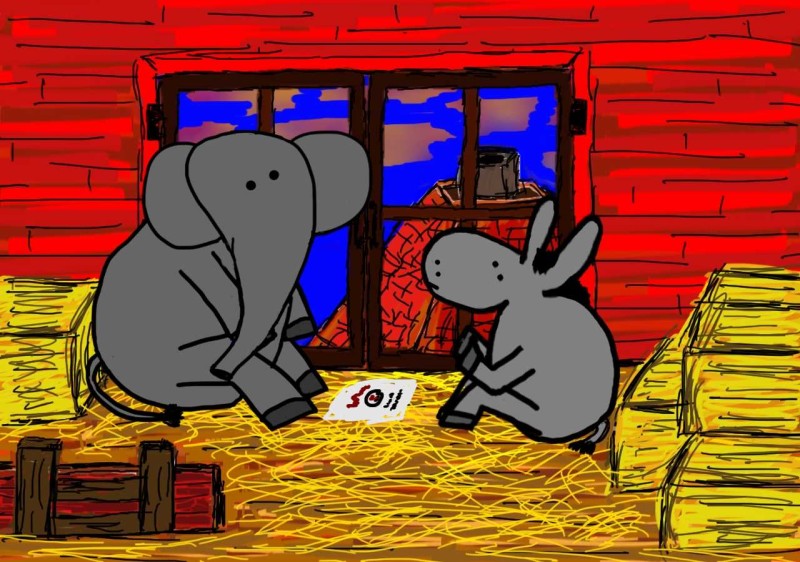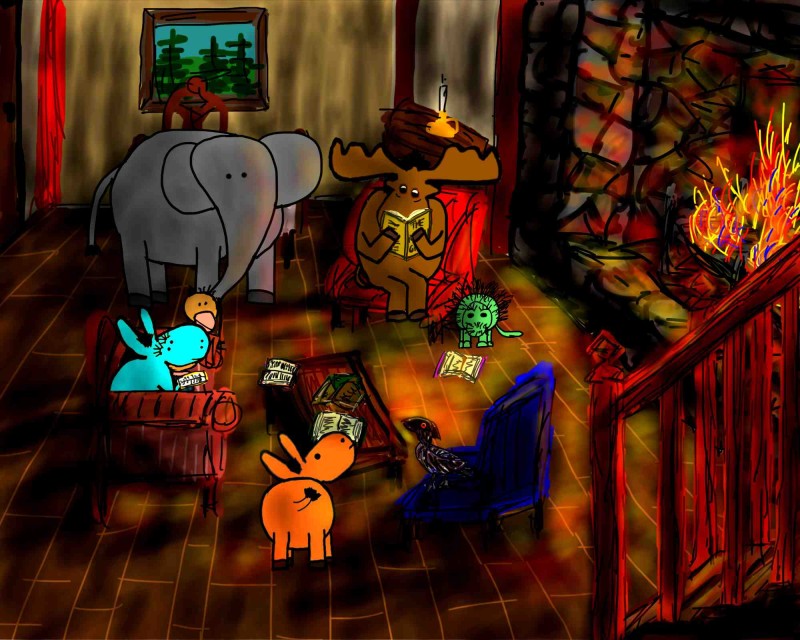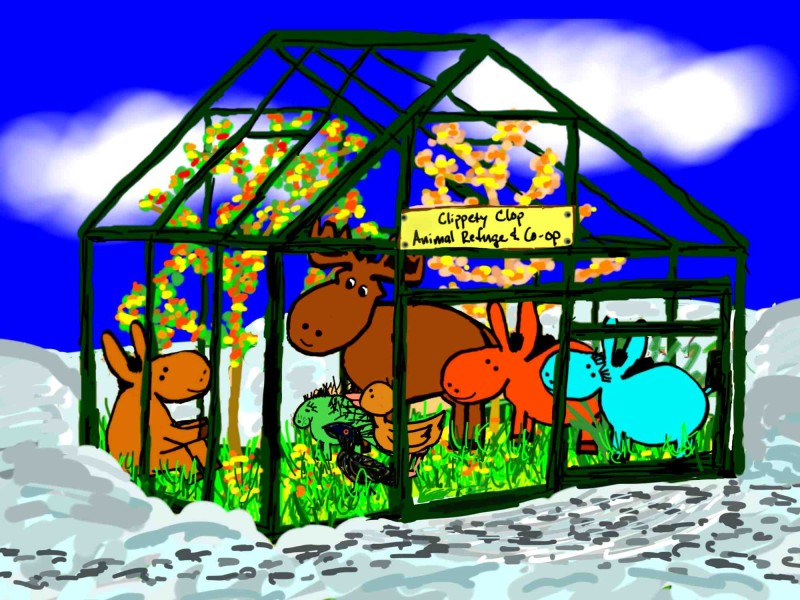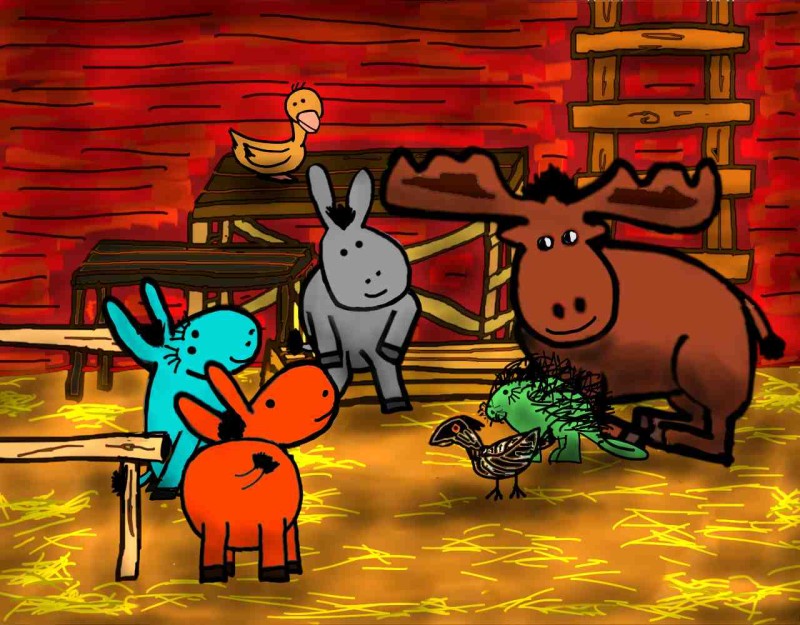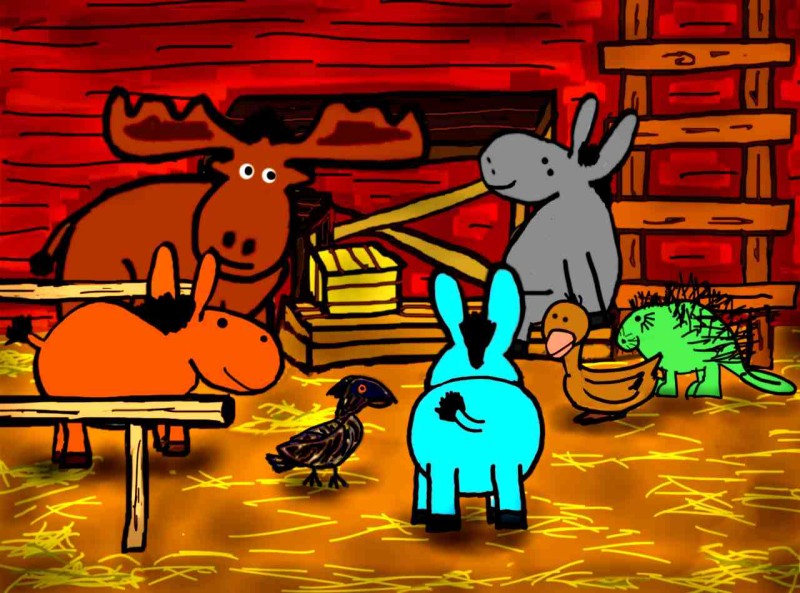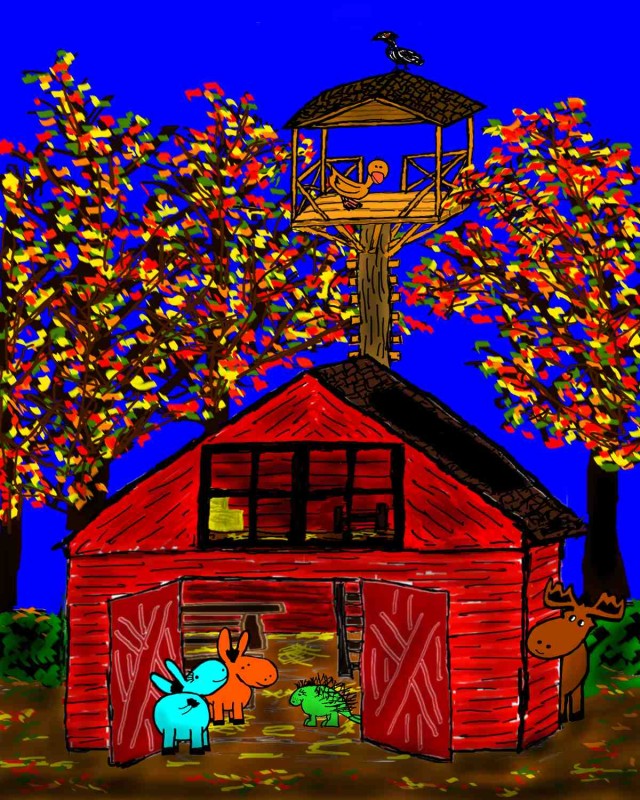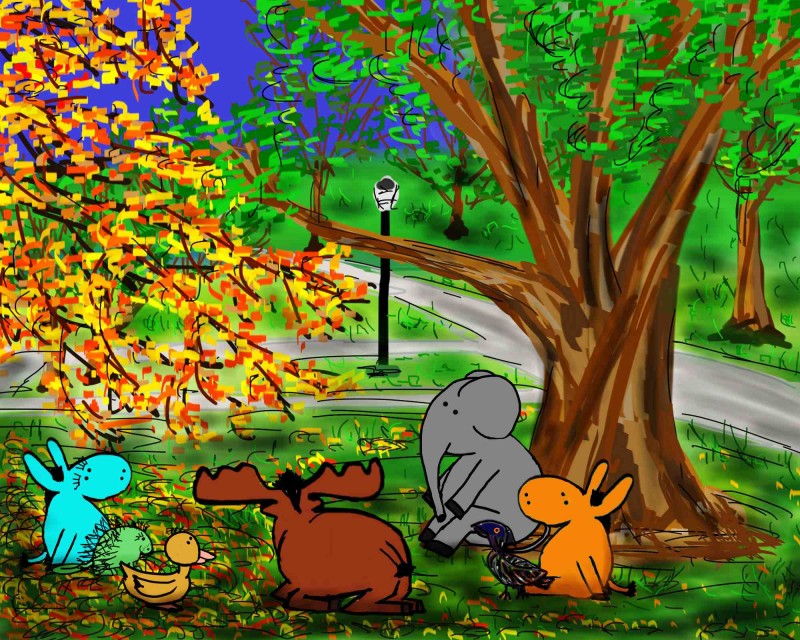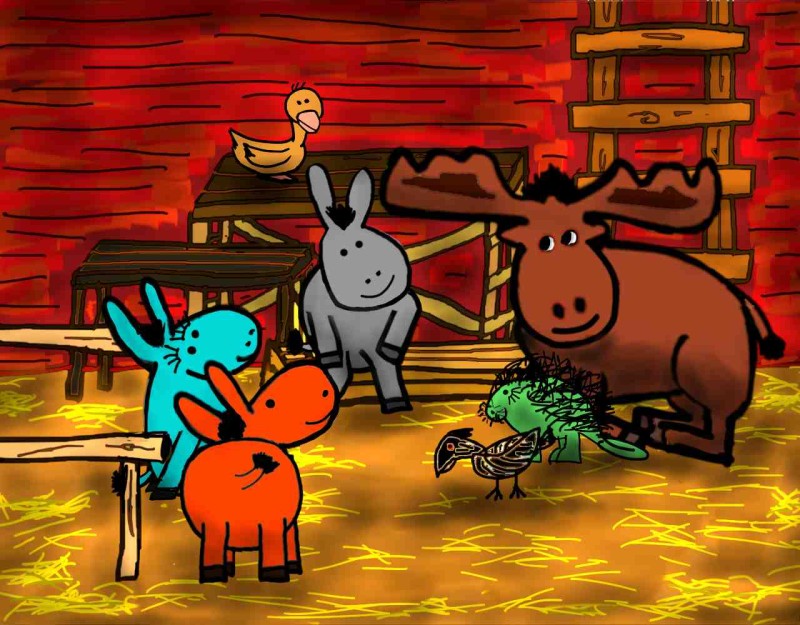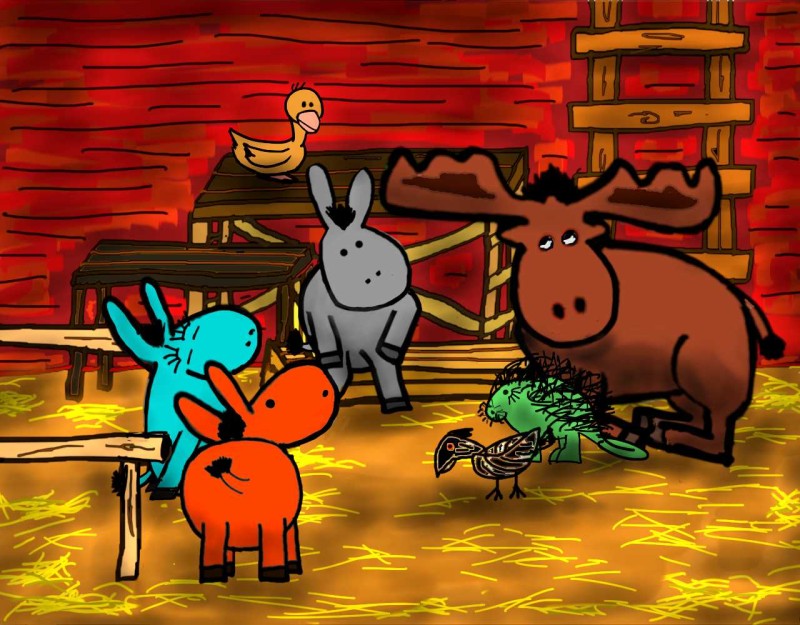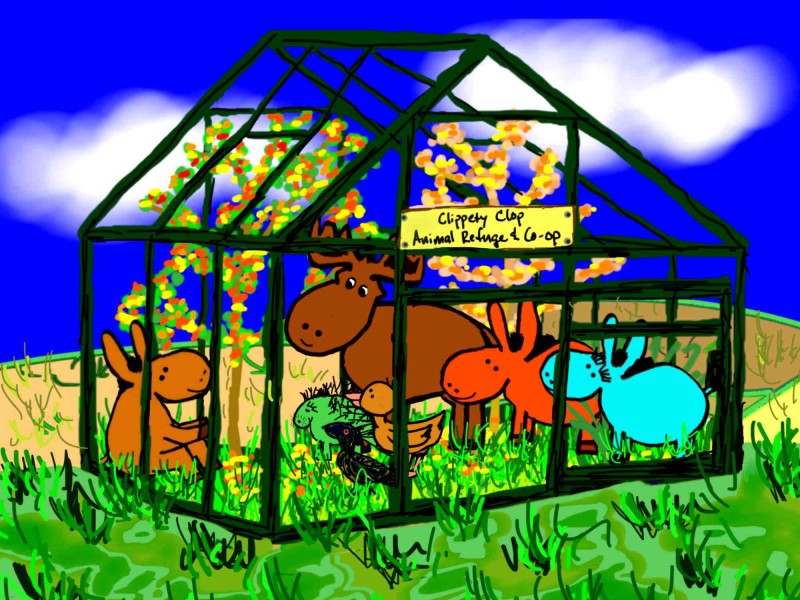Everywhere you go, said Blurtso, people are talking about the economic crisis. Do you think we should be worried? Worried about what? said Harlan. About our university, said Blurtso. How are we going to continue offering the services we’ve promised? What services? said Harlan. Our world-renowned classes, said Blurtso. The classes are free, said Harlan. What about our books? said Blurtso. The books are from the library, said Harlan. What about our Thursday evening pumpkin pies? said Blurtso. The pumpkins are from Pablo’s garden, said Harlan, in fact, everything in our university is absolutely free. It’s hard to believe, said Blurtso, what we’re doing isn’t against the law.
Tag: weohryant university
“Weohryant University” (XXVII) – Who 101
Today’s question, said Harlan, is “Who ate the last piece of pie?”
I didn’t do it, said Emma Lou.
Neither did I, said Frank.
Why is the last piece, said Morton, more important than the first?
Or any of the other pieces? said Emma Lou.
That’s a good question, said Frank.
It’s not polite, said Chelsea, to eat the first piece, and it’s greedy to eat the last.
If you didn’t get one of the earlier pieces, said Morton, it’s not greedy to eat the last.
That’s true, said Chelsea.
Who determines what is polite, said Frank, and what is not?
Baldassare Castiglione, said Glouster, wrote a book in the sixteenth century called, Il cortegiano.
Il what? said Morton.
Il cortegiano, said Glouster, is a book that describes how an educated person should behave in Renaissance Italy.
A book that defines courtesy? said Chelsea.
“Courtesy,” said Glouster, is “behavior marked by polished manners or respect for others.”
Respect for others? said Frank. That takes us back to “love thy neighbors” and the Upanishads.
Everything that’s worthwhile, said Emma Lou, takes us back to “love thy neighbors.”
Does Il cortegiano say who gets the last piece of pie? said Morton.
No, said Glouster, but it gives an outline of courteous behavior.
There’s not much of that around, said Chelsea.
Courteous behavior? said Glouster.
Yes, said Chelsea, just this morning I was crossing the street—in the crosswalk—and a truck honked me off the road.
I know what you mean, said Morton, I always say hello to people at the bus stop, but they look at me like I’m crazy.
Maybe they’ve never seen a talking donkey, said Frank.
That’s possible, said Morton.
What is Catiglione’s definition of courteous behavior? said Emma Lou.
Castiglione, said Glouster, says that a courtesan should be familiar with classical literature, skillful in athletic competition, adept in writing poetry, able to play musical instruments, accomplished in painting, conversant on philosophical themes, and knowledgeable and graceful in dance; and should be able to do these things with “sprezzatura.”
Gesundheit! said Chelsea.
Thank you, said Glouster, that was very polite, but I didn’t sneeze. “Sprezzatura” is the art of making difficult things look easy.
How do you do that? said Morton.
Practice, said Glouster.
Oh, said Morton.
Can we practice being courteous? said Chelsea.
Yes, said Emma Lou, let’s!
Well, said Glouster, we’re already reading classical literature, so we don’t have to do that, but we’ll have to start practicing sports, poetry, music, painting, and dance.
I love to dance! said Chelsea.
O.k., said Glouster, you can teach dance.
I can whistle and chirp, said Frank.
O.k., said Glouster, you can teach music.
I have a rhyming dictionary, said Emma Lou.
O.k., said Glouster, you can teach poetry.
I can draw circles with my hoof in the sand, said Morton.
O.k., said Glouster, you can teach painting.
How about moose? said Chelsea.
Moose can teach sports, said Glouster.
What will you teach? said Frank.
I’ll teach philosophy, said Glouster.
I can hardly wait to be a courtesan! said Emma Lou.
Me too! said Chelsea.
So what’s the answer, said Frank, to the original question.
The original question? said Chelsea.
Yes, said Frank, “Who ate the last piece of pie?”
The answer, said Morton, is that it’s time to bake a new pie.
“Weohryant University” (XXVI) – How 101
Welcome, said Pablo, to “How 101.” Today’s question is, “How are you?”
I’m fine, said Chelsea.
So am I, said Morton.
Me too, said Emma Lou.
I’m a little thirsty, said Frank.
So am I, said Glouster.
Now that you mention it, said Morton, I’m a little hungry.
So am I, said Frank.
I’ve got an itch behind my left ear, said Chelsea.
My right front paw is a little sore, said Emma Lou.
Do you think my tail is too short? said Morton.
My feet are too big, said Glouster.
Your tail is longer than mine, said Chelsea.
My quills aren’t very shiny, said Emma Lou.
My feathers are shiny, said Frank, but my beak is too sharp.
I wish I could swim, said Morton.
I wish I could fly, said Chelsea.
I sink like a stone, said Morton.
I float, said Emma Lou, even when I try to dive.
I think I have a sty, said Frank, in my left eye.
My paw is sore, said Emma Lou.
My back is stiff, said Morton.
One of my feathers is split, said Frank.
My left ear is bothering me, said Chelsea.
I suppose we’re all one day closer to death, said Glouster, than we were yesterday.
Yes, said Emma Lou, that’s true.
What was the question? said Morton.
The question, said Glouster, was “How are you?”
I’m fine, said Morton.
So am I, said Chelsea.
Me too, said Emma Lou.
I’m a little thirsty, said Frank.
So am I, said Glouster.
“Weohryant University” (XXV) – Who 101
Welcome to “Who 101,” said Harlan. Today’s question is “Who’s responsible?”
Responsible for what? said Morton.
I didn’t do it, said Emma Lou.
Neither did I, said Frank.
“Responsible,” said Glouster, means “being the cause or explanation; able to answer for one’s conduct and obligations; able to choose between right and wrong;” and, “marked by accountability.”
It’s not always easy to choose between right and wrong, said Chelsea.
Why not? said Frank.
Because what’s wrong for me, said Chelsea, may be right for someone else.
Like what? said Morton.
Like the color green, said Chelsea.
The color green? said Frank.
Yes, said Chelsea, the color green looks terrible on me, but it might look lovely on someone else.
Sometimes it’s also difficult, said Emma Lou, to answer for your conduct.
What conduct? said Frank.
Instinctive conduct, said Emma Lou. How can you answer for actions that are performed without thinking?
That’s true, said Morton, when I see a pumpkin pie, I can’t be held responsible for my conduct.
Or a shiny worm, said Frank.
Or a minnow, said Glouster.
Is there anything for which we can be held responsible? said Chelsea.
We can be held responsible for how we treat our friends, said Frank.
What about our enemies? said Chelsea.
Jesus, said Glouster, said we should love our enemies.
He didn’t mean cats, said Frank.
What if our enemies want to hurt us? said Chelsea.
An “enemy,” said Glouster, is “someone who is antagonistic to another, often seeking to injure, overthrow, or confound an opponent.”
You can love your enemy, said Emma Lou, without loving what they do.
Maybe you can convince them, said Chelsea, to act differently.
Yes, said Glouster, to act responsibly.
Even if that responsibility goes against their instincts? said Morton.
Maybe, said Emma Lou, responsibility can inspire us to alter our instincts so we can get along with others.
That, said Glouster, is called “social responsibility.”
“Social responsibility?” said Morton.
Yes, said Glouster, the responsibility that enables societies to exist, that enables individuals with different desires to live in harmony.
I like social responsibility, said Morton.
So do I, said Chelsea.
I don’t think cats are capable, said Frank, of social responsibility.
“Weohryant University” (XXIII)
The question for today’s class, said Blurtso, is: “What does two plus two equal?”
Two whats, said Morton, plus two whats?
Two cats, said Frank, plus two dogs?
I believe, said Glouster, it means the number two plus the number two, which equals four.
Four whats? said Morton.
Four of the same, said Glouster.
Is it possible to have four of the same? said Emma Lou.
What do you mean? said Morton.
Are any two things, said Emma Lou, exactly alike?
No, said Glouster, they’re not, but the number two plus the number two equals the number four because numbers are a human invention, they only exist in imagination.
So two pumpkin pies, said Morton, are not two pumpkin pies?
The name “pumpkin pie”, said Emma Lou, is an invention that refers to the “idea” of a pumpkin pie—words and numbers are ideas. There are no individual things in the universe.
What? said Chelsea.
There are no individual things, said Emma Lou.
What about me? said Morton. I’m an individual thing.
So am I, said Chelsea.
At the subatomic level, said Emma Lou, there is only the ebb and flow of energy.
E=mc², said Glouster.
Exactly, said Emma Lou.
I’m not good at math, said Chelsea.
Neither am I, said Morton.
E=mc², said Glouster, suggests that a physical system (like the universe) has a property called energy and a corresponding property called mass; the two properties are equivalent in that they are always present in the same proportion to one another. The mass–energy equivalence arose from the theory of special relativity, developed by Albert Einstein, who proposed the idea in a 1905 paper entitled, “Does the inertia of an object depend upon its energy-content?” In the equation E=mc², “E” is the amount of energy, “m” is the amount of mass, and “c” is the speed of light.
The speed of light, said Morton, is 186,000 miles per second.
Very good! said Emma Lou.
Thank you, said Morton, I remembered when Glouster told us last week.
Donkeys, said Chelsea, have very good memories.
Yes, said Morton, we do.
So what’s the point? said Frank.
The point, said Emma Lou, is that you can describe everything in the universe as either energy or mass. And if mass is energy, then everything is in a constant state of flux.
Flux? said Frank.
“Flux,” said Glouster, “is the process of flowing, the process of continual change.”
And that’s why, said Emma Lou, there are no individual things in the universe, because everything is a constant flow of changing energy.
Like a river? said Chelsea.
Yes, said Emma Lou, a river of energy.
And words and numbers, said Glouster, are inventions we use to chop the river into separate parts.
But those parts, said Emma Lou, are not really separate.
If they’re not really separate, said Morton, why do we pretend they are?
Perhaps, said Emma Lou, because we’re uncomfortable with change, and like to believe that individual, unchanging things exist.
Like individual pumpkin pies? said Morton.
Yes, said Emma Lou, and individual donkeys, crows, ducks, porcupines, and mooses.
If everything is a river of energy, said Frank, and we are all just fluctuations of a single stream, does that mean that two plus two equals one?
Yes, said Enma Lou, and it also means that Einstein, the Upanishads, and the Tao Te Ching are talking about the same thing.
“Weohryant University” (XXII) – What 101
The question for today’s class, said Blurtso, is: “What is the difference between sympathy and empathy?”
Sympathy and empathy? said Morton.
“Sympathy,” said Glouster, “is a relationship between persons or things wherein whatever affects one similarly affects the other.”
And empathy? said Chelsea.
“Empathy,” said Glouster, “is the capacity for experiencing as one’s own the feelings of another.”
That sounds like the same thing, said Frank.
Both words, said Glouster, come from the Greek word, “pathos,” meaning, “suffering, emotion, passion.” In Greek “sym” means “with” and “em” means “in.” So sympathy is “suffering with” another, while empathy is “suffering in” another.
I still don’t understand, said Morton.
Isn’t that the same as compassion? said Emma Lou.
“Compassion,” said Glouster, is “sorrow or pity aroused by the suffering of another.” It is derived from the Latin words “com” or “with” and “passion” or “suffering.”
So “compassion,” said Emma Lou, is the Latin equivalent of the Greek word “sympathy.”
Exactly, said Glouster.
That still doesn’t tell me, said Morton, the difference between sympathy and empathy.
Both words, said Glouster, imply a relationship, or “oneness” between the subject and object, between the “sympathizer” and the other.
Just like in the Upanishads, said Emma Lou, and the Tao Te Ching. Both books talk about the oneness of all things, that separation is just an illusion.
The gospel of Matthew, said Glouster, says “love your enemies.”
Does it say you and your enemies are one? said Emma Lou.
Not exactly, said Glouster, but it goes on to say, “I tell you, whatever you did for one of the least of these brothers and sisters of mine, you did for me.”
That’s pretty much the same thing, said Chelsea.
The gospel of John, said Glouster, says, “do unto others as you would have them do unto you.”
Isn’t that compassion? said Chelsea.
“Compassion,” said Emma Lou, is feeling someone else’s pain as your own. The way to do that is not to see others as separate from you.
One hundred fourteen of the one hundred fifteen verses of the Quran, said Frank, begin with “In the name of Allah the compassionate, the merciful…”
Ommmm, said moose.
What? said Glouster.
I think he said “Ommmm,” said Frank.
Ommmm (phonetically “aum”), said Emma Lou, is from the Upanishads, it is the monosyllable which contains all syllables and all sounds. It represents the oneness underlying multiplicity—the non-duality of “Brahman” beneath the dualism and illusion of “Maya.”
The illusion of Maya? said Morton.
The illusion that we are not all one, said Emma Lou.
So compassion, said Frank, is recognizing—beyond the illusion of separation—that we are all one?
Exactly, said Emma Lou.
I still don’t understand, said Morton, the difference between sympathy and empathy.
Think of it this way, said Glouster. When someone is suffering because of a specific situation, but you have not experienced that situation yourself, you can only sympathize with them, but if you have experienced that same situation, you can empathize.
That’s very confusing, said Chelsea.
Yes, said Morton, I feel exactly the same way.
“Weohryant University” (XX)
Do you think we’re early? said Morton.
I don’t want to appear anxious, said Emma Lou.
Neither do I, said Chelsea.
How long should we wait? said Morton.
Until it’s time, said Emma Lou.
How will we know? said Morton.
They’ll tell us, said Emma Lou.
What if they don’t? said Morton.
Then we’ll never know, said Chelsea.
They’ll tell us, said Emma Lou, if they want us to know.
And if they don’t? said Morton.
Then they won’t tell us, said Emma Lou.
That makes sense, said Chelsea.
Where are the others? said Morton.
They’re waiting for us to decide, said Chelsea.
They don’t want to appear anxious, said Emma Lou.
What’s wrong with appearing anxious? said Morton.
It makes you look greedy, said Emma Lou.
Even if you’re willing to share? said Morton.
Maybe they want us to wait, said Chelsea.
Why? said Morton.
Because anticipation increases desire, said Emma Lou.
Yes, said Chelsea, like in the Kama Sutra.
The Kama Sutra? said Morton.
The Kama Sutra, said Chelsea, is one of the books on our reading list.
The one the moose keeps hogging? said Morton.
Yes, said Chelsea, but I managed to sneak a peak.
What does it say? said Morton.
It says that withholding pleasure increases desire, and increasing desire increases pleasure.
What if you don’t get what you desire? said Morton.
Then you still get the pleasure of anticipating, said Chelsea.
The pleasure of anticipating? said Morton.
Yes, said Chelsea, like when you spend the winter anticipating the spring fashions, and when the fashions come out, you’re a little disappointed, but at least you had the pleasure of anticipating them.
That happens for me, said Emma Lou, every season of the year.
But sometimes when you get something, said Morton, it’s as good as what you had hoped for.
That’s true, said Chelsea, but getting it doesn’t diminish the pleasure you got from anticipating it.
It teaches you, said Emma Lou, to enjoy the journey and not focus on the destination.
The destination? said Morton.
The object of desire, said Emma Lou.
We’ve waited long enough, said Morton.
You may be right, said Emma Lou.
I wonder if the others are enjoying the wait? said Chelsea.
Birds can be very patient, said Emma Lou.
That’s true, said Morton, I watched Frank sit on a fence for five hours yesterday.
You watched him for five hours? said Chelsea.
Yes, said Morton.
And you didn’t get impatient? said Chelsea.
No, said Morton, I didn’t want to eat him.
So you’re only impatient, said Emma Lou, with things you want to consume?
Yes, said Morton.
What if you’re not hungry? said Emma Lou.
There are some things I want to consume, said Morton, whether I’m hungry or not.
That’s not very healthy, said Emma Lou.
I know, said Morton.
Do you smell that? said Chelsea.
Yes, said Emma Lou, I do.
It must be time, said Chelsea.
Yes, said Emma Lou, it must be time.
Really? said Morton, I was just starting to enjoy the anticipation.
“Weohryant University” (XIX) – Where 101
Today’s question, said Harlan, is: “Where did it go?”
Where did what go? said Chelsea.
It was here just a minute ago, said Morton.
I didn’t take it, said Emma Lou.
Neither did I, said Frank.
Do you mean “ubi sunt”? said Glouster.
Ubi sunt? said Morton.
“Ubi sunt,” said Glouster, is Latin for “Where are they?” It comes from a Latin poem that begins, “Ubi sunt qui ante nos in mundo fuere?” which translates: “Where are they who, before us, existed in the world?” It was a common theme in medieval poetry, and was most famously expressed by the French poet, François Villon who asked, “Où sont les neiges d’antan?” or “Where are the snows of yesteryear?”
The snows of yesteryear? said Morton.
I don’t like snow, said Chelsea.
Neither do I, said Frank.
I don’t mind it, said Emma Lou, so long as I’m not far from my den.
Why would anyone worry about last year’s snow? said Morton.
It’s a metaphor, said Glouster, for all the things you’ve lost in your life.
Lost? said Chelsea.
Yes, said Glouster, the things you had in the past that you no longer have.
The things I’ve eaten? said Morton.
Yes, said Glouster, and the friends you’ve lost, and your lost youth.
My lost youth? said Chelsea.
Yes, said Glouster.
I’m not going to lose my youth, said Chelsea.
Of course you are, said Glouster.
Really? said Chelsea.
Yes, said Glouster.
In that case, said Chelsea, I don’t like “ubi sunt.”
Crows live forever, said Frank.
They do? said Morton.
Sure, said Frank, crows, or “ravens”, and nightingales, and even some other birds.
Are you sure? said Morton.
Yes, said Frank, just ask Edgar Allen Poe and John Keats.
Who are they? said Chelsea.
They are poets, said Frank, who wrote about birds who live forever, birds who travel from heaven to earth to hell and then back again.
Have you been to heaven and hell? said Chelsea.
No, said Frank, not yet.
I don’t want to go to hell, said Morton.
Heaven and hell, said Glouster, are metaphors for, “the realm of the dead.”
I don’t want to go there either, said Morton.
Maybe, said Chelsea, that’s where the “ubi sunts” are.
I know a song, said Frank, about “ubi sunt.”
What’s it called? said Chelsea.
It’s called “The Ashgrove,” said Frank, and it has a blackbird in it.
How does it go? said Chelsea.
I don’t remember all the words, said Frank, but it’s about a woman who loses her lover and looks for him in an ashgrove.
Does she find him? said Chelsea.
No, said Frank, he’s buried beneath the green turf.
Is that a metaphor for “the realm of the dead”? said Morton.
Yes, said Frank.
Why doesn’t the blackbird, said Chelsea, fly to the realm of the dead, talk to the dead lover, then return and talk to the woman so she can have a sense of closure?
That’s a good question, said Frank.
What’s closure? said Morton.
Closure, said Chelsea, is talking with your ex-lover until you have nothing more to say.
Why would you want to do that? said Morton.
Because, said Chelsea, if you say everything you have to say, you can stop thinking about him when he’s gone.
So he doesn’t become an “ubi sunt”? said Morton.
Yes, said Chelsea.
I would like to be an “ubi sunt”, said Emma Lou.
So would I, said Glouster.
Why? said Chelsea.
Because, said Glouster, I don’t want to be forgotten.
Being forgotten, said Emma Lou, would be like a second death.
Maybe it’s a good thing, said Morton, for people to go around asking “ubi sunt?”
Why? said Chelsea.
Because, said Morton, it keeps the dead from dying.
“Weohryant University” (XVIII) – What 101
“Weohryant University” (XVI) – When 101
Today’s question, said Pablo, is: “When is it too late?”
Too late for what? said Morton.
I didn’t do it, said Emma Lou.
Too late for planting? said Frank.
“Lateness,” said Glouster, is “arriving or remaining after the due, usual, or proper time.”
The proper time? said Chelsea. Who decides what is the proper time?
Your boss does, said Frank.
Or your teacher, said Glouster.
Or whoever makes the rules, said Morton.
Whoever has the power, said Emma Lou.
Michel Foucault, said Glouster, said: “The strategic adversary is fascism… the fascism in us all, in our heads and in our everyday behavior, the fascism that causes us to love power, to desire the very thing that dominates us.
Am I a fascist? said Chelsea.
I don’t think you’re a fascist, said Morton.
What’s a fascist? said Frank.
“Fascism,” said Glouster, is “a political philosophy, movement, or regime that exalts nation and often race above the individual and stands for a central autocratic government headed by a dictatorial leader, severe economic and social regimentation, and forcible suppression of opposition.”
That doesn’t sound like me, said Chelsea.
It can also mean, said Glouster, “a tendency toward or actual exercise of strong autocratic or dictatorial control.”
Dictatorial control? said Morton.
A dictator, said Glouster, is “someone granted absolute power, often ruling oppressively.”
Do I have absolute power? said Chelsea.
Foucault goes on to say, said Glouster, “It is my hypothesis that the individual is not a pre-given entity which is seized upon by the exercise of power. The individual, with his identity and characteristics, is the product of a relation of power exercised over bodies, multiplicities, movements, desires, forces.”
Seized on by the exercise of power? said Frank.
Does that mean, said Chelsea, that I’m a victim.
Both a victim, said Emma Lou, and a dictator.
Foucault adds, said Glouster, that “there is no power relation without the correlative constitution of a field of knowledge, nor any knowledge that does not presuppose and constitute at the same time power relations.”
Isn’t that a vicious circle? said Chelsea.
Yes, said Glouster.
How did we get caught, said Frank, in this vicious circle?
We were talking, said Emma Lou, about who decides what is too late and what is not too late.
Sometimes, said Frank, nature decides what is too late.
Yes, said Morton, like when it’s too late to plant pumpkins in order to have a good harvest in the fall.
Does that mean, said Chelsea, that nature is a fascist?
A fascist, said Emma Lou, that desires to be exploited by itself.
But I am a part of nature, said Morton. Does that mean I’m constantly exploiting myself?
Yes, said Emma Lou.
So if I grow a pumpkin, said Morton, then make a pumpkin pie, then eat it, I’m exploiting myself?
Yes, said Emma Lou.
In that case, said Morton, I should try to exploit myself more often.
When is it too late, said Chelsea, to plant pumpkins for a good harvest?
I don’t know, said Morton, I’ve never planted a pumpkin.
You haven’t? said Chelsea.
No, said Morton, I’ve always exploited the pumpkin someone else planted.
That’s shameful, said Chelsea.
Is it? said Morton.
What if, said Emma Lou, the person who planted the pumpkin derived pleasure from Morton’s exploitation of the pumpkin?
You mean, said Frank, the pleasure one gets from sharing with someone else?
Exactly, said Emma Lou.
That’s a good question, said Chelsea.
What would Foucault say? said Frank.
I’m not sure, said Glouster, I suppose he would say that the act of sharing is an act of exploitation, a disguised power-play designed to manipulate the recipient into a position of gratitude and subservience.
I think, said Chelsea, the world would be a better place if more of us went around exploiting each other by sharing.
